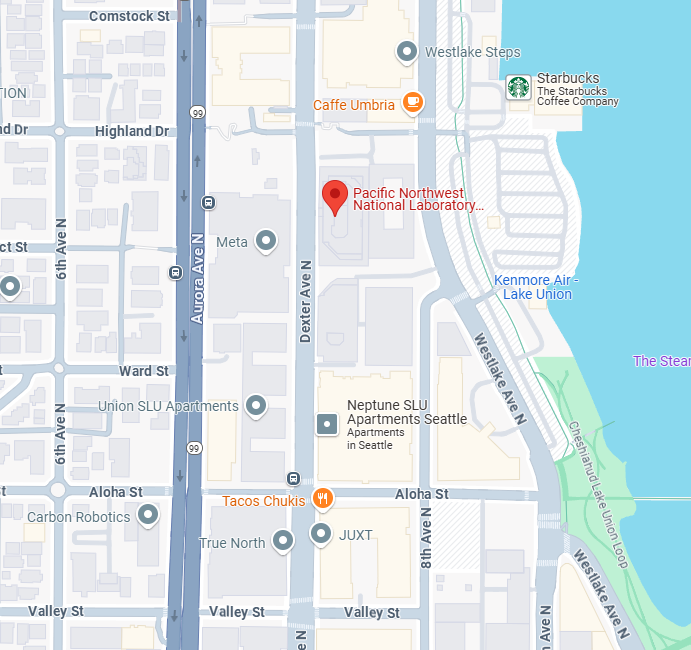
PNNL-Seattle
PNNL-Seattle
A Portal to 21st Century Partnerships
A Portal to 21st Century Partnerships
The PNNL-Seattle campus is located in the heart of Seattle’s South Lake Union and bustling Innovation District, alongside leading tech companies, research institutions, and universities. PNNL-Seattle provides a portal to Department of Energy national laboratory staff, facilities, and equipment used to solve some of the nation’s most pressing issues.
PNNL-Seattle’s presence dates back more than 50 years, when we focused initially on nuclear nonproliferation policy. Today, PNNL-Seattle is home to researchers, analysts, and other subject matter experts spanning the national security, energy, and environmental mission space.
Together with industry partners and key collaborators, our staff accelerate discovery for 21st century problems and opportunities in data science, cybersecurity, software engineering, artificial intelligence, energy system engineering, earth and coastal science, nuclear nonproliferation, and more.
PNNL-Seattle has more than 300 employees, interns, and post-graduate research associates. We leverage our location to increase our mission impact through regional sponsor engagement, research collaboration with private sector and academic institutions, and as a portal for recruiting top talent. Tapping into the region’s innovation hotbed allows us to tackle complex issues at the nexus of science, technology, and policy and grow our capabilities and impact across the Laboratory.
PNNL-Seattle Related News & Publications
Eight PNNL Researchers Elected to Washington State Academy of Sciences
Laying the Groundwork for a Quantum Leap in Chemistry
Directions

PNNL-Seattle is located at:
1100 Dexter Ave N
Suite 500
Seattle, WA 98109
From 99 North
Heading north on Aurora (Highway 99), take the Aloha Street exit.
Turn left on to Dexter and the building will be on the right.
From 99 South
Heading south on Aurora (Highway 99) take the Dexter Way N exit (2nd exit after the Aurora Bridge).
Dexter Way N curves under Highway 99 and meets Dexter Ave N.
Turn right onto Dexter and the building will be on your left.
From I-5 North or South
Take the Mercer Street exit and follow Mercer Street to Dexter Ave N.
Turn right on to Dexter and the building will be on the right.
Parking
Parking is available in the 1100 Dexter parking garage between 7:00 AM - 7:00 PM, Monday - Friday. The entrance is on the north side of 1100 Dexter (not the neighboring 1000 Dexter building). The rates are $4.00 for the first hour, or $14.00 per day. The “early bird” rate is $11.00 per day. Visitor can pay and exit all gates. The maximum height clearance is 6' 3". Over-height vehicles can use the 8th Ave N entrance. Park in any space that is not reserved. PNNL does not validate parking. Street parking is also available.
Public Transportation
King County Metro has service close to the office from its 40 and 62 bus lines. If you take Link light rail from the Seattle-Tacoma International Airport to the Westlake station and exit to the east, walking three blocks north along 6th Avenue will enable you to catch either bus from the Blanchard & 6th stop. Visit the King County Metro Bus Service webpage for route details, current fares, and other important information.
Contact
1100 Dexter Avenue North, Suite 500
Seattle, WA 98109
206-528-3200
Fax: 206-528-3551
